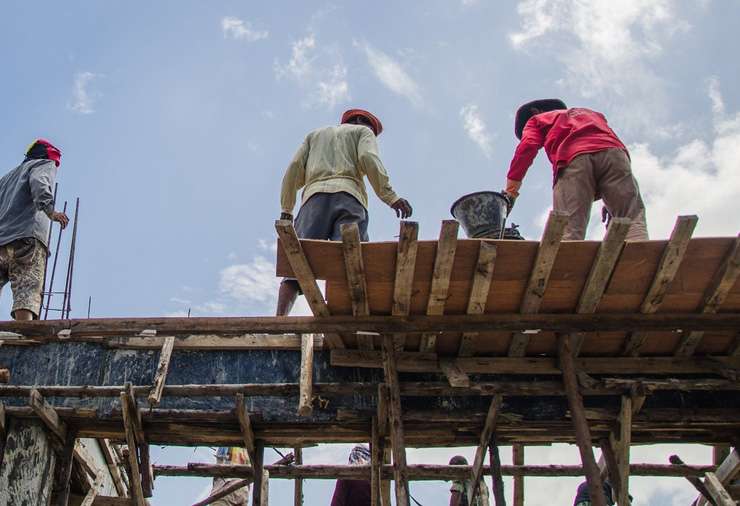More companies have been liquidated in the construction industry this year than other industries, according to figures provided to OneRoof, although the exact numbers of builders who have collapsed is not distilled.
Ritanz, an organisation which represents insolvency practitioners, says between January and May this year, 25 per cent of all insolvent liquidations were in the construction industry – that’s more than double the number for the next highest sector, the accommodation and food services sector at 12 per cent.
And data from the Ministry of Business, Innovation and Employment (MBIE), given to OneRoof in a written response to questions, shows 120 companies with a construction code in the Companies Office were liquidated between January to the end of June.
That’s lower than for the same six months last year when 128 companies were liquidated. There were 95 for the same period in 2020 and 123 in 2019.
Start your property search
Bolen Ng, MBIE’s regional manager business registries, says the liquidations for the first six months of this year represent less than .2 per cent of the total number of companies with the code, saying the Companies Register has 89,469 registered companies (as of this week) which selected a construction business industry classification code.
Those companies represent residential and non-residential construction, including heavy and civil engineering companies and companies involved in land development.
John Fisk, the chair of Ritanz, says there’s no doubt the construction industry is under stress but he points out there are traditionally a “reasonably high” number of building-related insolvencies anyway.
That’s often because large contracts are undertaken by someone who may not have a lot of capital to start with.
“That can effectively be a man in a van, so to speak, and they end up entering into quite large contracts and then if the contracts start to go awry they tend to go awry quickly and cause failure so it's not unusual to see a number in that sector.”
The sector is under more stress now because of cost escalations, supply chain issues and labour issues, Fisk says.
“It’s probably one of the sectors that we're seeing that's suffering more than others at the moment but that's from a pretty low base given that we've seen in the last two years historically low insolvency numbers.”

Labour and supply chain issues have put the squeeze on a lot of building companies’ finances. Photo / Getty Images
The advice to home buyers is to thoroughly check out builders and developers before signing a contract.
Fisk says when a building company fails it causes a dominoes effect as subcontractors are also affected.
“I wouldn't say it's just the small ones you need to be concerned about, it's anyone that's in the industry because there is a lot of co-dependence among trades that work together that could be impacted if one fails.”
Buyers need to understand who they are contracting with, including getting information on their financial strengths, or at least trying to.
“Sometimes you're not going to get it anyway but that's the risk. Once you've entered into the contract and you're halfway through it it's a bit late to start investigating what the financial position is of the builder.”
Fisk recommends carrying out a credit check and opting for a builder with the best reputation or the strongest balance sheet.
It’s also worth having a look through the Companies Office to see what other companies a person owns or is associated with.
A directors search in the Companies Office will show companies that have gone into liquidation or receivership, or that have been struck off in the past.
If someone has a number of liquidated companies while still operating other companies it would be worth seeing whether the liquidations were solvent or not.
It’s not unusual for builders to set up what are called Special Purpose Vehicles for individual construction contracts in order to contain risk.
“If you're doing a $20m build then if something goes wrong with that you don't want to bring the whole company down so you've isolated if it goes wrong.”

Auckland lawyer Joanna Pidgeon says buyers who have purchased off the plan should be able to get their deposit back. Photo / Supplied
Sometimes those entities are well set up and might be put into solvent liquidation after the contract has been completed.
But “certainly it's an alarm bell if you see 10 companies that have gone into liquidation and they've all left behind large amounts of creditors that have been unpaid.”
Auckland lawyer Joanna Pidgeon says when buying off the plan accepted practice is for the deposit to be held in a solicitor’s trust account and if the company goes bust the buyer should get the deposit back, but the buyer is left back where they started and prices will probably have increased in the meantime.
She warns, though, it could take time to get the deposit back if the developer is liquidated because the liquidator may want to try to sell the project as a going concern, “so you might not be able to just cancel the agreement and walk away.”
People who contract a builder to build their home are in a different situation because they enter into a contract with a builder, pay the deposit to the builder and usually pay for the build in stages.
Pidgeon says they need to make sure they don’t pay all the money at once so they have enough left over to complete the build should their builder go bust in the middle of it.
“Checking that you're not exposed by having paid too much money ahead of time, or you haven't retained enough money to complete it, is probably the key concern.”
Her advice is people do their due diligence on the builder ahead of time, including reference checks and credit checks.
“Any size can go under so whether they are smaller or big, nobody is too big.
“I think when it comes to building projects, are they a licensed building practitioner, how experienced are they at building, because if they are someone that's jumped on to the bandwagon and just hired a few people do they have the skills not just to build well but to do it in a timely manner to manage the project?
“We usually do search the Company's Office, and certainly if it's just a $100 shelf company you should be taking that into your assessment as to whether or not that would be someone who you want to have as your building contractor.”
Once the build is underway, Pidgeon advises regular site visits. She says talk to subcontractors because if they are not being paid that’s often a key early indication of insolvency.
“Maybe turn up at the site and just ask, just make contact with the subcontractors and say ‘look, if there's ever an issue with you not being paid let me know.’"
She also recommends people who are not experienced in building consider hiring an independent project manager who has better oversight of payments and who can make sure the project remains on task.
Pidgeon says she has not had clients facing these scenarios to date, but independent economist Tony Alexander believes a “correction/reality check” is underway in the construction sector.
Too many people went too far out on a limb in the last couple of years in committing their resources to try to get houses built, he says, and while record building consents have been issued he thinks many will not be acted on because of issues like the soaring cost of materials meaning the numbers no longer add up.












































































